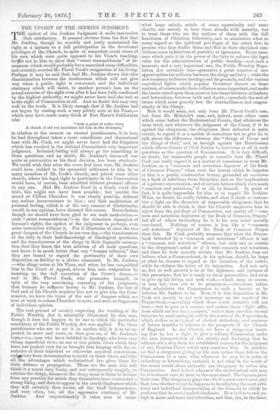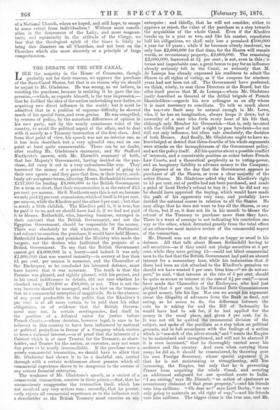THE UPSHOT OF THE JENKINS J UDGMENT.
THE upshot of the Jenkins Judgment is more instructive than satisfactory. It seemed obvious from the first that Mr. Jenkins, though he sturdily and justly maintained his right as a layman to a full participation in the devotional privileges of the Church, in spite of somewhat crude views of his own which were quite opposed to his Vicar's teaching, laslit not in him to show that "sweet reasonableness" of de- meanour which would probably have smoothed away difficulties, and certainly averted Mr. Flavel Cook's resignation of his living. Perhaps it may be said that, had Mr. Jenkins shown this nice discrimination between the resoluteness which will not give way when a public right is concerned, and the individual obstinacy which will insist, to another person's loss, on the actual exercise of the right even after it has been fully confirmed by the highest authority, we might never have had the suit as to the right of Communion at all. And no doubt this may very well be the truth. It is likely enough that if Mr. Jenkins had not begun by casting such a very pebbly note at his Vicar,— which may have made many think of Bret Harte's Californian who
" took a point of order when A chunk of old red sandstone hit him in the abdomen,"
in relation to the sermon on eternal punishments, if, in fact, he had throughout taken a more considerate and discussional tone with Mr. Cook, we might never have had the litigation which has resulted in the Judicial Committee's very important judgment. Irritated feeling will always go for something in these questions, and no doubt, Mr. Jenkins's throw-off was quite as provocative as his final decision has been obstinate. We could wish that after the cause had been won, Mr. Jenkins could have yielded to the memorial addressed to him by so many members of Mr. Cook's church, and joined some other church, where his legal right to participate in the Communion would have, of course, been admitted without personal offence to any one. Had Mr. Jenkins lived in a lonely rural dis- trict, this might not have been possible ; but amidst the crowd of Clifton Churches it was clearly possible, without any serious inconvenience to him ; and that moderation of personal feeling, which is of the very essence of Christianity, would, in our opinion, have dictated this course. Nevertheless, though we should have been glad to see such moderation,— such " sweet reasonableness,"—in the victorious champion of laymen's rights, the upshot of the judgment is, perhaps, even more instructive without it. For it illustrates at once the two great dangers of the Church in our own day,—the tenaciousness of the laity in their half-knowledge of theological questions, and the tenaciousness of the clergy in their dogmatic assump- tion that they know the true solution of all such questions, and know it so much better than any "human tribunal," that they are bound to regard the pertinacity of their own disposition as fidelity to a divine command. In Mr. Jenkins, —who slings notes at his Vicar, and when he has vanquished him in the Court of Appeal, drives him into resignation by insisting on the full execution of the Court's decree,— and in Mr. Flavel Cook, who persuades himself, in spite of the very convincing reasoning of the judgment, that because he swIpects heresy in Mr. Jenkins, the law of God and of his Church requires him not to give him the Com- munion, we have the types of the sort of dangers which are ever at work to reduce Churches to sects, and sects to fragments of individual opinion.
The real ground of anxiety respecting the working of the Public Worship Act is admirably illustrated by this case, though it does not happen to be one to which the particular machinery of the Public Worship Act was applied. The three parishioners who are to set it in motion it is to be ex- pected, be more and more, as time goes on, of Mr. Jenkins's type,—i.e., men who have dabbled in theology, who have very strong superficial views on one or two points, views which they have not pushed very far or brought into keeping with the re- mainder of their inherited or otherwise acquired convictions, and/very keen determination to insist on those views, and take all the advantages which ecclesiastical law gives them for their defence or propagation. These are the men who will think it a moral duty freely, and not unfrequently roughly, to criticise the clergy, whenever the clergy seem to them to deviate from any practice for which they themselves have- contracted a strong liking, and then to oppose to the moral displeasure which they will certainly thus excite, all the bluff independence, and very often, too, all the aggressive obstinacy of Mr. Jenkins. And unquestionably it takes men of some- what large minds, minds of some equanimity and some charity, not merely to bear these attacks with serenity, but to treat those who are the authors of them with the full heartiness of Christian fellowship, and to administer what so many regard as the spiritual privileges of the select few, to persons who thus buffet them and find in their cherished con- victions mere indications of puerility or ignorance. Every mea- sure which puts it in the power of the laity to enforce the legal rules for the administration of public worship—and such a measure, and a very important one, the Public Worship Regu- lation Act certainly was—generates a great number of new opportunities for collision between the clergy and laity ; while the new tendency to discuss theology and its grounds, and the various superficial lights which popular literature throws on these matters, of course make these collisions more important, and make the issues raised upon them more or less issues between orthodoxy and heterodoxy, between faith and doubt,—precisely the sort of issues which most gravely test the charitableness and magna- nimity of the Clergy..
Now it would seem, not only from Mr. Flavel Cook's case, but from Mr. Ridsdale's case, and, indeed, most other oases which come before the Ecclesiastical Courts, that whatever the issue tried, and whatever the judgment of the Court, if it be against the clergyman, the clergyman thus defeated is quite certain to regard it as a matter of conscience not to give in, to talk about the difference between the "things of Caesar and the things of God," and to inveigh against the Erastianism which allows Courts of Civil Justice to intervene at all in such questions as the question of Communion. It is very difficult, no doubt, for reasonable people to conceive how Mr. Flavel Cook can really regard it as a matter of conscience to treat Mr. Jenkins as a "common and notorious depraver of the Book of Common Prayer," when even the heresy which he imputes to him is a purely constructive heresy, grounded on omissions in a book of selections from Scripture, and on the implications of a private conversation, and of certain letters which were made "common and notorious," if at all, by himself. In point of fact, it is quite impossible for him so to regard Mr. Jenkins. What, no doubt, he really thinks, and what it sheds so instruc- tive a light on the character of respectable clergymen that he should be able to think, is that his Church empowers him to reject from the privilege of Communion, not merely all " com- mon and notorious depravers of the Book of Common Prayer," but all of whose heteredoxy he is in his own mind morally convinced. Nothing, of course, is less like a " common and notorious " depraver of the Book of Common Prayer than this. Mr. Cook probably assumes that what the Prayer- book intended by a " common and notorious " offence is not a " common and notorious " offence, but only one as certain to the clergyman's mind as if it were common and notorious, and since he feels morally certain that Mr. Jenkins does not believe what a Communicant, in his opinion, should, he leaps at what he chooses to regard as the intention of the rubric, while he violates the letter of its injunction. And not only so, but so well assured is he of the rightness and justness of this procedure, that he is ready to incur persecution, and even to give up his living, and seek work,—which may, of course, or may not, turn out to be promotion,—elsewhere, rather than administer the Communion to such a heretic as he believes Mr. Jenkins to be. Now, it is this disposition in Mr. Cook not merely to put new meanings on the words of the Prayer-book,—meanings which those words certainly will not bear,—but to pose as a martyr, and endure those "light afflic- tions which are but for a moment," rather than sacrifice eternal interests by conforming his will to the words of the Prayer-book, which strikes us as typical of clerical orthodoxy, and ominous of future troubles in relation to the prospects of the Church of England. In one Church, we have a clergyman insist- ing that he has a right to give a solitary Communion under the true interpretation of the rubric, and declaring that he will not stir a step from his established custom for the judgment of any Erastian Court which may condemn him. In another, we find a clergyman giving up his cure rather than deliver the Communion to a man who, whatever he may be in point of orthodoxy or heterodoxy, certainly is not what in the words of the canon would alone authorise any clergyman to refuse him Communion. And indeed whatever the ecclesiastical suit may be, it is almost sure to issue in the same result. The laymen press their case. The clergyman plays the )01e of a persecuted saint, and that, too, whether or not he happens to be adopting the most arbi- trary and individual interpretation of the formula to which he professes that he owes implicit obedience. How is this to end, ex- cept in more and more individualism, and that, too, in the heart of a National Church, where we hoped, and still hope, to escape to some extent from individualism ? Without more concili- ation in the demeanour of the Laity, and more magnan- imity and equanimity in the attitude of the Clergy, we fear that the theological spirit of the times is likely to bring dire disasters on all Churches, and not least on the Churches which aim most sincerely at a principle of large comprehension.



































 Previous page
Previous page